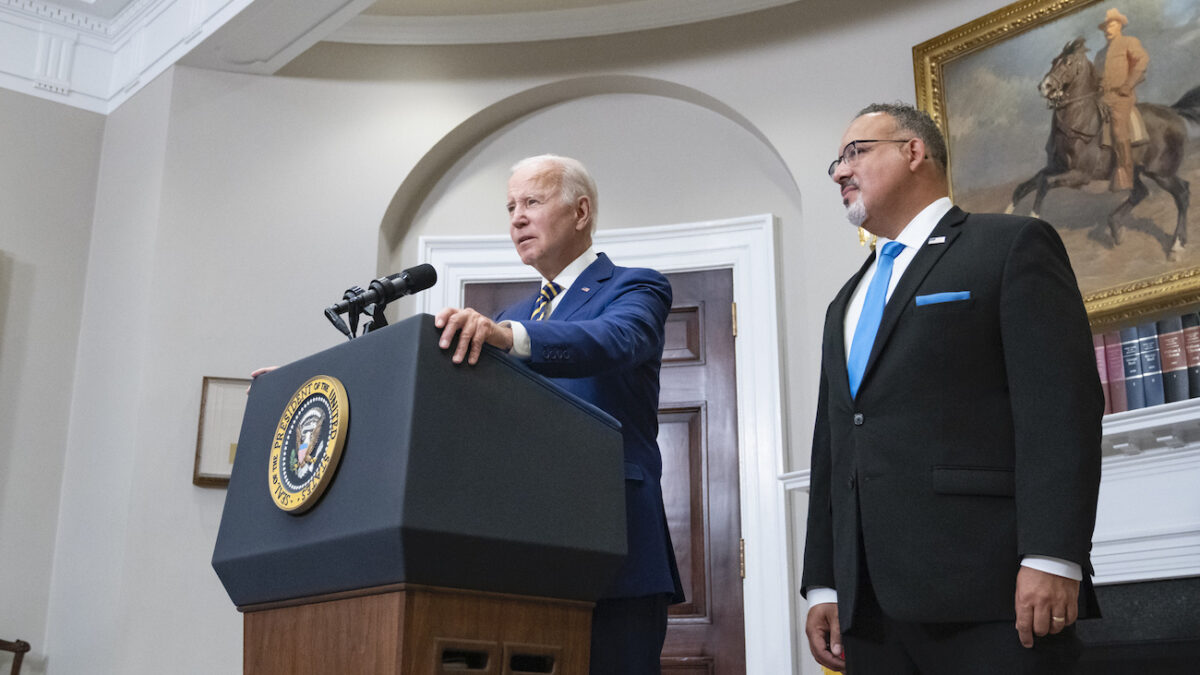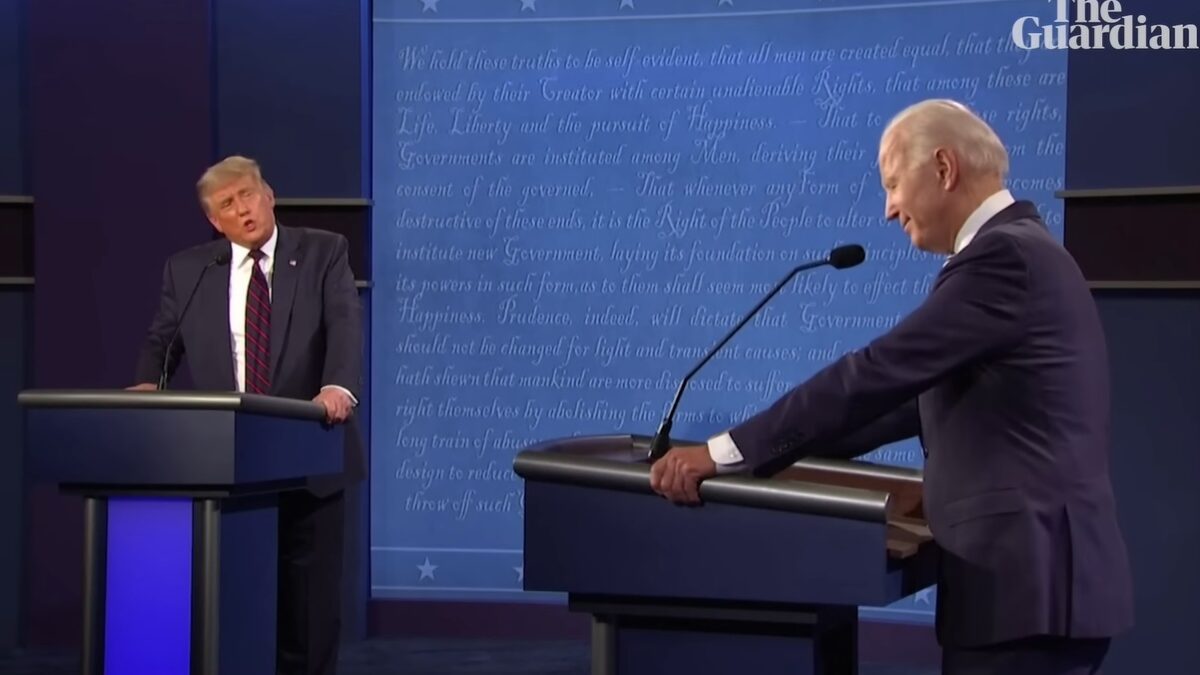A federal court in Texas held that when the Biden administration established its $400 billion student-loan “forgiveness” program, it unconstitutionally exercised “legislative powers” that the U.S. Constitution vested in Congress. Thursday’s decision in Brown v. U.S. Department of Education then “vacated” the ed department’s loan-cancelation plan, rendering it legally non-existent and striking a huge blow to the Biden administration.
In a 26-page opinion, Trump-appointed federal Judge Mark Pittman ruled the Department of Education lacked authority to create the loan-forgiveness program the Biden administration announced in August 2022. That program “canceled” student loans up to $20,000 for individuals making less than $125,000 individually or $250,000 as a couple, if the individual received a Pell Grant while in college, or up to $10,000 in the absence of a Pell Grant.
Shortly after the announcement of the debt bailout program, Myra Brown and Alexander Taylor filed suit against the Department of Education (DOE). Brown, who did not qualify for any debt forgiveness because her loans are commercially held, and Taylor, who qualifies for only $10,000 in loan forgiveness because he had not received any Pell Grants, argued that the DOE violated the Administrative Procedure Act by failing to provide affected individuals notice of the impending program and an opportunity to comment on the plan. Brown and Taylor also alleged that the Department of Education had no authority to grant loan forgiveness.
The plaintiffs sought a preliminary injunction barring the Biden administration from canceling any student loans pending resolution of their case. However, after the Eighth Circuit Court of Appeals entered an administrative stay, temporarily freezing the program, Judge Pittman provided the parties notice of his intent to rule on the merits of the entire case, rather than merely decide whether to issue a preliminary injunction now and then resolve the full case later.
Both Brown and Taylor agreed with Pittman’s proposal, while the Biden administration objected, claiming the case was not ready for resolution. In his Thursday opinion, Pittman rejected the Biden administration’s concerns, concluding there was no need for factual development of the case. Rather, Pittman concluded that as a matter of law, the plaintiffs had standing to sue and the DOE exceeded its constitutional authority in adopting the bailout plan.
Standing to sue, in general, means the party or parties bringing a lawsuit have suffered an injury, and prior to Thursday’s decision, the Biden administration successfully sidestepped challenges to its plan by claiming the plaintiffs lacked this standing. But on Thursday, the court ruled that both Brown and Taylor had standing because they both had alleged they were injured by being excluded from the debt discharge, either wholly in the case of Brown, or partially, in the case of Taylor.
After holding that the plaintiffs had standing, or the right to sue, the court addressed their argument that the DOE exceeded its authority under the HEROES Act to forgive student loans. The HEROES Act grants the secretary of education authority to “waive or modify any statutory or regulatory provision applicable to the student financial assistance programs,” “as the Secretary deems necessary in connection with a war or other military operation or national emergency.” The Biden administration maintained that the purported Covid emergency allowed the DOE to wipe out student loans under the HEROES Act.
The court rejected that argument based on the “major question doctrine,” which provides that “if an agency claims the power to make decisions of vast ‘economic and political significance,’” the agency must show there is “clear congressional authorization” for the power it claims. Providing an estimated $400 billion in student loan forgiveness, the court reasoned, constituted a decision of “vast economic and political significance,” and therefore, Congress must have clearly authorized the DOE to cancel student loans.
The court concluded Congress had not provided such explicit authorization to the DOE, first noting that “the HEROES Act does not mention loan forgiveness.” The opinion also highlighted the fact that the DOE had previously concluded it lacked authority to cancel student loans, reasoning that the agency’s past conflicting interpretations of the HEROES Act indicated the statute lacked clear congressional authorization for the program. That Congress has failed to pass loan forgiveness also supported the court’s conclusion.
After concluding the DOE exceeded its authority, the court held that the proper remedy was a “vacatur” of the agency’s action. A “vacatur” is a voiding of a law, or here the agency action, which “retroactively undoes” or “expunges” or “unwinds the challenged agency action.” In other words, the court declared the Biden bailout plan nonexistent. The court opted to vacate the plan instead of issuing a nationwide injunction, the latter of which merely blocks enforcement of the regulation at issue.
The court further decided there was no reason to return the case to the DOE since the agency’s “misstep” in adopting the loan forgiveness program was “not correctible.” Rather, the DOE’s “complete usurpation of congressional authorization implicating the separation of powers required by the Constitution” rendered the loan forgiveness program impermissible. Therefore, there was nothing the DOE could do to address the error, the court explained.
Thursday’s opinion proved devastating for the Biden administration. First, the court found the plaintiffs had standing and prevailed as a matter of law on their challenge to the plan. Second, the court entered judgment on the merits in favor of the plaintiffs. Third, the court vacated the entire loan bailout plan, erasing it from books, with the court further holding the DOE lacked any possible fix.
While several other cases challenging the DOE’s loan forgiveness plan remain pending, this case will likely take the lead in deciding the fate of the Biden administration’s efforts to discharge student debt by executive action. And absent a stay of Thursday’s opinion, which is unlikely, the Biden administration’s hands will be tied while it appeals the decision. Until then, the DOE will be unable to discharge any student loans.









